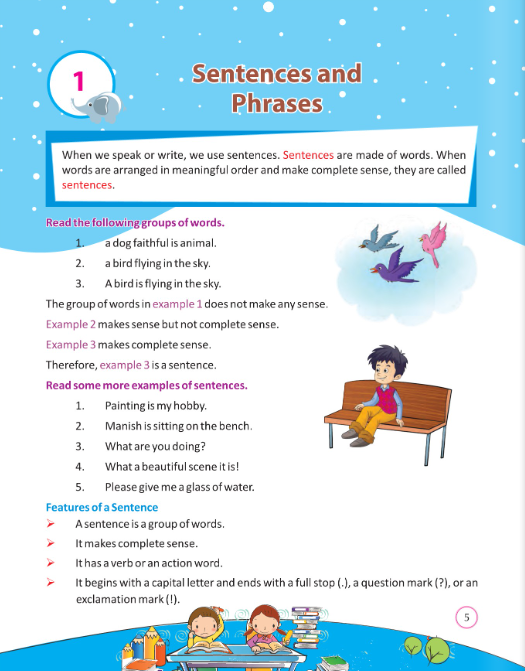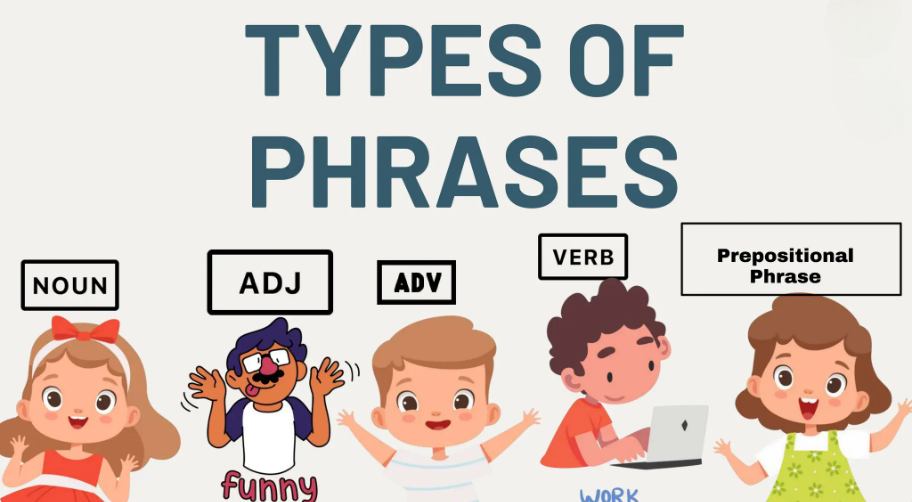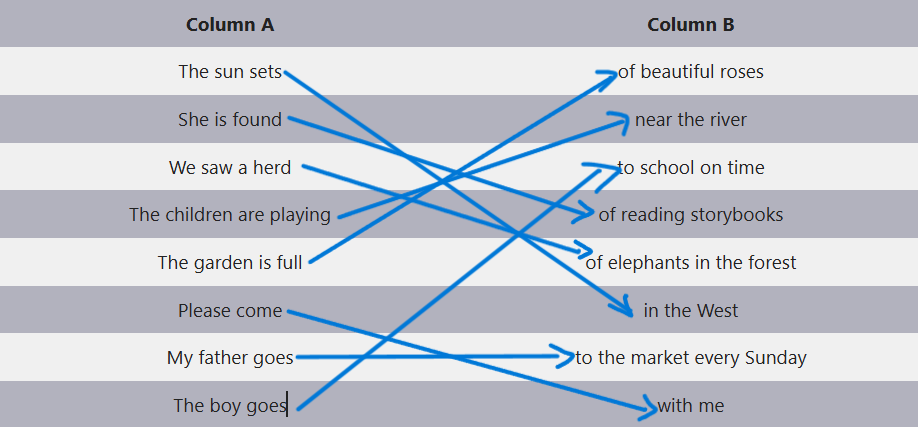
Learn Class 5 English grammar | Sterling Phrases And Sentences Class 5 Worksheet pdf Solved | Chapter 1 is an important step for students. At this stage, children move from basic sentence making to understanding detailed grammar rules like tenses, direct and indirect speech, active and passive voice, and writing skills. With a proper English Grammar book PDF or Basic English grammar PDF, it makes it easier for both students and parents to practice at home.
In this article, we’ve included sentence and phrase examples to ensure students can confidently distinguish between the two and use them effectively in their own work. Whether you’re a student, teacher, or parent, this ultimate guide will simplify grammar concepts and provide step-by-step practice to build a strong foundation in English.
Table of Contents
Class 5 English Grammar Phrases and Sentences Worksheet Solved | Must Read
Phrases
1. What is a Phrase?
Answer: A phrase is a group of words that has meaning but does not make complete sense on its own because it does not have both a subject and a verb. A phrase is like a small part of a sentence that adds extra information.
2. Some Examples of Phrases.
Answer: Some examples of phrases are
- In the garden: this is a phrase. It gives us an idea but does not form a complete thought.
- The boy in the garden is playing. – Now the phrase “in the garden” is part of a complete sentence.
3. Features of Phrases.
Answer: We can find which one is a phrase by determining these features.
- A phrase is a group of words.
- It does not have both a subject and a verb.
- It cannot stand alone as a sentence.
- It adds detail or meaning to a sentence.
Example:
- On the table
- After the match
- Running fast
- The red car
Kinds of Phrases
There are kinds of phrases.

1. Noun Phrase (phrases and sentences)
A phrase that acts like a noun in a sentence. It names a person, place, thing, or idea.
Example: The tall building looks beautiful. Here, the phrase “tall building” acts like a noun in this sentence.
2. Verb Phrase (phrases and sentences)
A phrase that contains a main verb and helping words. It tells what someone is doing.
Example: She is playing football. Here, the phrase “is playing football” acts like a main verb in this sentence.
3. Adjective Phrase
A phrase that describes a noun or pronoun.
Example: I saw a girl full of joy. Here, the phrase “full of joy” acts like it describes a noun or pronoun.
4. Adverb Phrase
A phrase that describes a verb, adjective, or another adverb. It tells how, when, where, or why something happens.
Example of adverb phrase: We will meet after lunch. Here the phrase “after lunch” acts like it describes a verb, adjective, or another verb.
5. Prepositional Phrase
A phrase that begins with a preposition and gives more information about a noun or verb.
Example of prepositional phrase: The book is on the table. Here, “on the table” acts like a prepositional phrase.
5. Infinitive Phrase
A phrase that begins with to + verb and acts as a noun, adjective, or adverb.
Example of Infinitive phrase: I like to play football.
Sentences
1. What is a Sentence?
Answer: When we speak or write, we use sentences. Sentences are made of words. When words are arranged in meaningful order and make complete sense, they are called sentences.
2. Some Examples of Sentences.
Answer: Some examples of sentences are
- Manish is sitting on the bench.
- What are you doing?
- Please give me a glass of water.
So, you can see that each and every group of words in the above list makes sense. And these are called sentences, which make meaningful and complete sense.
3. Features of Sentences.
Answer: We can find which one is a sentence by determining these features.
- A sentence is a group of words.
- It makes complete sense.
- It has a verb or an action word.
- It begins with a capital letter and ends with a full stop.
Example:
- In the sky
- Flying
- Birds
We can see that the group of words given above does not make complete sense. We can change them into sentences by adding a few words.
The birds are flying in the sky. Now this is making complete sense. So, we can say this is a sentence.
Kinds of Sentences
There are kinds of sentences:

1. Assertive or declarative Sentences (phrases and sentences)
The sentences that simply say or state something are called assertive or declarative sentences.
Example:
- Sunday is a holiday
- Mango is my favourite fruit.
- Puneet and Ankit are playing cricket.
These sentences say or state something. You can write down some more examples of assertive or declarative sentences in your notebook.
2. Imperative Sentences (phrases and sentences)
A sentence that expresses a request, a command, or a piece of advice is called an imperative sentence. It ends with a full stop (.).
Example:
- Please lift this box. (a request)
- Get out of the room. (an order)
- You should brush your teeth twice a day. (advice)
You can write down some more examples of imperative sentences in your notebook.
3. Interrogative Sentences (phrases and sentences)
A sentence that asks a question is called an interrogative sentence. An interrogative sentence ends with a question mark (?).
Example:
- Where do you live?
- Have you finished your homework?
- Why are you crying?
All the sentences end with a question mark (?) and ask a question. You can write down some more examples of interrogative sentences in your notebook.
4. Exclamatory Sentences
A sentence that expresses a strong feeling or emotion is called an exclamatory sentence. These sentences express surprise, joy, sorrow, appreciation, love, anger, etc. An exclamatory sentence ends with an exclamation mark (!).
Example:
- What a beautiful flower it is!
- Hurrah! We won the competition!
All the sentences end with an exclamation mark (!) and ask a question. You can write down some more examples of exclamatory sentences in your notebook.
Exercise—Phrases and Sentences class 5 Worksheet With PDF Solved
A. Identify the following sentences as assertive, interrogative, or exclamatory sentences. (page – 8)
1. How beautiful the rose is!
Answer: Exclamatory sentence
2. Diwali is the festival of lights.
Answer: Assertive sentence
3. Give me a glass of water.
Answer: Imperative sentence
4. My mother makes delicious cookies.
Answer: Assertive sentence
5. Stay where you are.
Answer: Imperative sentence
6. Who broke the glass?
Answer: Interrogative sentence
7. Please take that away from me.
Answer: Imperative sentence
8. I have lost my purse.
Answer: Assertive sentence
B. Rearrange the words given below to make meaningful sentences. (page – 8)
1. water drink from I a glass.
Answer: I drink water from a glass.
2. a on there is book table the.
Answer: There is a book on the table.
3. the always I truth speak.
Answer: I always speak the truth.
4. You can this book pass to Rohan.
Answer: You can pass this book to Rohan.
5. using she is computer a.
Answer: She is using a computer.
6. with please come here me.
Answer: Please come here with me.
C. Rearrange the words to make sentences as directed. Begin each sentence with a capital letter and use proper punctuation marks at the end. (page – 9)
1. a what pleasant surprise. (exclamatory)
Answer: What a pleasant surprise!
2. your room clean. (imparative)
Answer: Clean your room.
3. yesterday had she fever. (assertive)
Answer: She had fever yesterday.
4. on the train was time. (interrogative)
Answer: Was the train on time?
5. she how lovely looks. (exclamatory)
Answer: How lovely she looks!
6. me song let sing a. (imperative)
Answer: Let me sing a song.
7. hit the boy dog the a with stick. (exclamatory)
Answer: The boy hit the dog with a stick!
8. time what the is. (interrogative)
Answer: What is the time?
D. Complete the sentences with meaningful phrases. (page – 9)
1. A policeman is standing _______________.
Answer: A policeman is standing at the corner of the street.
2. We must walk _______________.
Answer: We must walk carefully on the slippery road.
3. The jars are _______________.
Answer: The jars are full of pickles and jam.
4. We listen to the radio _______________.
Answer: We listen to the radio in the evening.
5. The farmer works _______________.
Answer: The farmer works in the field every day.
6. The shopkeeper sales _______________.
Answer: The shopkeeper sells fresh fruits and vegetables.
7. The potatoes are _______________.
Answer: The potatoes are in the basket.
8. Anne goes to work _______________.
Answer: Anne goes to work by bus every morning.
9. We send presents _______________.
Answer: We send presents to our friends and relatives.
10. Birds begin to sing _______________.
Answer: Birds begin to sing at dawn.
Class 5 English Grammar Worksheet pdf Solved – Phrases and Sentences
A. Match the phrases to make meaningful sentences.
| Column A | Column B |
|---|---|
| The sun sets | of beautiful roses |
| She is found | near the river |
| We saw a herd | to school on time |
| The children are playing | of reading storybooks |
| The garden is full | of elephants in the forest |
| Please come | in the West |
| My father goes | to the market every Sunday |
| The boy goes | with me |
Answer:


1 thought on “Sterling | Phrases And Sentences Class 5 Worksheet pdf Solved | Chapter 1 | Class 5 English Grammar | Ultimate Guide”